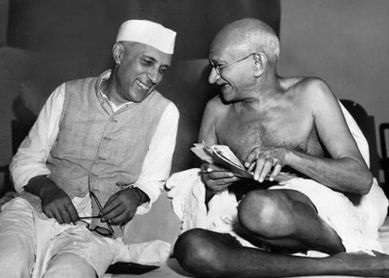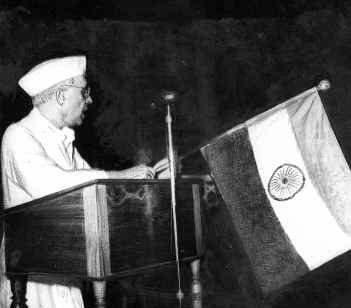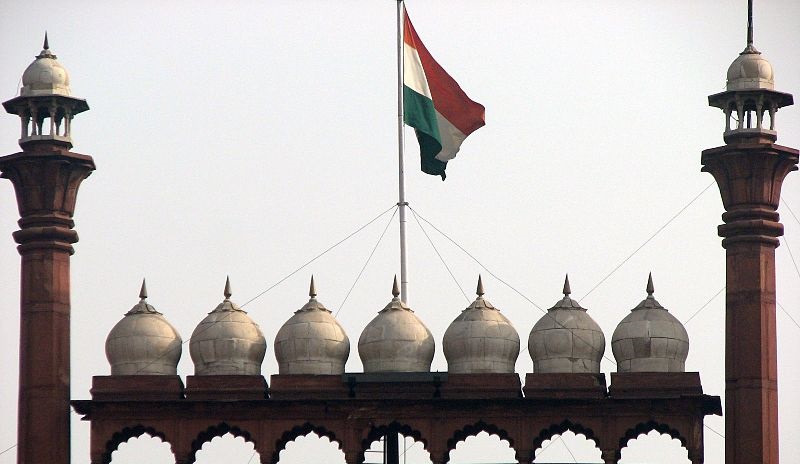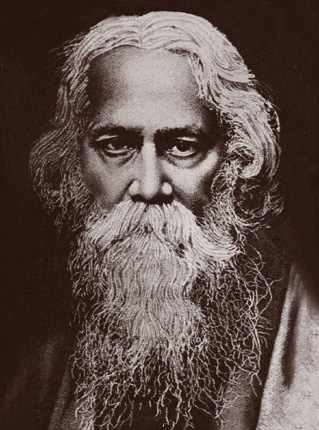Friday, August 15, 1947 - Birth of India's Freedom (Nation Wakes to New Life)
In this post you shall find the speech by Jawaharlal Nehru delivered to Indians around midnight on the 15th of August in 1947.

"Long years ago we made a tryst with destiny, and now the time comes when we shall redeem our pledge, not wholly or in full measure, but very substantially. At the stroke of the midnight hour, when the world sleeps, India will awake to life and freedom. A moment comes, which comes but rarely in history, when we step out from the old to the new, when an age ends, and when the soul of a nation, long suppressed, finds utterance.
It is fitting that at this solemn moment, we take the pledge of dedication to the service of India and her people and to the still larger cause of humanity. At the dawn of history, India started on her unending quest, and trackless centuries are filled with her striving and grandeur of her success and failures. Through good and ill fortune alike, she has never lost sight of that quest, forgotten the ideals which gave her strength. We end today a period of misfortunes and India discovers herself again. The achievement we celebrate today is but a step, an opening of opportunity to the greater triumphs and achievements that await us. Are we brave enough and wise enough to grasp this opportunity and accept the challenge of the future? Freedom and power bring responsibility. The responsibility rests upon this Assembly, a sovereign body representing the sovereign people of India. Before the birth of freedom, we have endured all the pains of labour and our hearts are heavy with the memory of this sorrow. Some of those pains continue even now. Nevertheless, the past is over and it is the future that beckons us now.

That future is not one of ease or resting but of incessant striving so that we may fulfill the pledges we have so often taken and the one we shall take today. The service of India means, the service of the millions who suffer. It means the ending of poverty and ignorance and disease and inequality of opportunity. The ambition of the greatest men of our generation has been to wipe every tear from every eye. That may be beyond us, but as long as there are tears and suffering, so long our work will not be over. And so we have to labour and to work, and to work hard, to give reality to our dreams. Those dreams are for India, but they are also for the world, for all the nations and peoples are too closely knit together today for any one of them to imagine that it can live apart. Peace is said to be indivisible, so is freedom, so is prosperity now, and also is disaster in this one world that can no longer be split into isolated fragments. To the people of India, whose representatives we are, we make an appeal to join us with faith and confidence in this great adventure. This is no time for petty and destructive criticism, no time for ill-will or blaming others. We have to build the noble mansion of free India where all her children may dwell.
The appointed day has come -the day appointed by destiny- and India stands forth again, after long slumber and struggle, awake, vital, free and independent. The past clings on to us still in some measure and we have to do much before we redeem the pledges we have so often taken. Yet the turning-point is past, and history begins anew for us, the history which we shall live and act and others will write about. It is a fateful moment for us in India, for all Asia and for the world. A new star rises, the star of freedom in the East, a new hope comes into being, a vision long cherished materializes. May the star never set and that hope never be betrayed! We rejoice in that freedom, even though clouds surround us, and many of our people are sorrow-stricken and difficult problems encompass us.

But freedom brings responsibilities and burdens and we have to face them in the spirit of a free and disciplined people. On this day our first thoughts go to the architect of this freedom, the Father of our Nation, who, embodying the old spirit of India, held aloft the torch of freedom and lighted up the darkness that surrounded us. We have often been unworthy followers of his and have strayed from his message, but not only we but succeeding generations will remember this message and bear the imprint in their hearts of this great son of India, magnificent in his faith and strength and courage and humility. We shall never allow that torch of freedom to be blown out, however high the wind or stormy the tempest. Our next thoughts must be of the unknown volunteers and soldiers of freedom who, without praise or reward, have served India even unto death. We think also of our brothers and sisters who have been cut off from us by political boundaries and who unhappily cannot share at present in the freedom that has come. They are of us and will remain of us whatever may happen, and we shall be sharers in their good [or] ill fortune alike. The future beckons to us. Whither do we go and what shall be our endeavour? To bring freedom and opportunity to the common man, to the peasants and workers of India; to fight and end poverty and ignorance and disease; to build up a prosperous, democratic and progressive nation, and to create social, economic and political institutions which will ensure justice and fullness of life to every man and woman. We have hard work ahead. There is no resting for any one of us till we redeem our pledge in full, till we make all the people of India what destiny intended them to be. We are citizens of a great country on the verge of bold advance, and we have to live up to that high standard. All of us, to whatever religion we may belong, are equally the children of India with equal rights, privileges and obligations. We cannot encourage communalism or narrow-mindedness, for no nation can be great whose people are narrow in thought or in action. To the nations and peoples of the world we send greetings and pledge ourselves to cooperate with them in furthering peace, freedom and democracy. And to India, our much-loved motherland, the ancient, the eternal and the ever-new, we pay our reverent homage and we bind ourselves afresh to her service."

Jawaharlal Nehru (November 14, 1889 – May 27, 1964) was a political leader of the Indian National Congress, a leader of the Indian independence movement and first Prime Minister of the Republic of India. Popularly referred to as Panditji (Scholar), Nehru was also a writer, scholar and amateur historian, and the patriarch of India's most influential political family.
As the son of the wealthy Indian barrister and politician Motilal Nehru, Nehru had become one of the youngest leaders of the Indian National Congress. Rising under the mentorship of Mahatma Gandhi, Nehru became a charismatic, radical leader, advocating complete independence from the British Empire. An icon for Indian youth, Nehru was also an exponent of socialism as a means to address long-standing national challenges. Serving as Congress President, Nehru raised the flag of independent India in Lahore on December 31, 1929. A forceful and charismatic orator, Nehru was a major influence in organizing nationalist rebellions and spreading the popularity of the nationalist cause to India's minorities. Elected to lead free India's government, Nehru would serve as India's prime minister and head of the Congress until his death.
As India's leader, Nehru oversaw major national programmes of industrialization, agrarian and land reforms, infrastructure and energy development. He passionately worked for women's rights, secularism and advancement of education and social welfare. Nehru initiated the policy of non-alignment and developed India's foreign policy under the ideals of Pancasila. However, he was criticized for failure of leadership during the Sino-Indian War in 1962. Later after his successor Lal Bahadur Shastri's demise, Nehru's daughter, Indira Gandhi, would go on to lead the Congress and serve as prime minister, as would his grandson Rajiv. Rajiv's widow Sonia and her children lead the Congress today, maintaining the Nehru-Gandhi family's prominence in Indian politics.
+++++++++++++++++++
Nehru was not alone in his penning words that would inspire generations. The briliant beyond words Rabindranath Tagore penned his own words to inspire generations. His brilliance won him the Nobel Prize in a time when Indian's were being enslaved and treated as susbservient. Such was the power and luster of his writings. Below is an excerpt from his works.

Where the mind is without fear and the head is held high.
Where knowledge is free.
Where the world has not been broken up into
fragments
By narrow domestic walls.
Where words come out from the depth of truth.
Where tireless striving stretches its arms
towards perfection.
Where the clear stream of reason has not lost its
way
Into the dreary desert sand of dead habit.
Where the mind is led forward by Thee
Into ever-widening thought and action.
Into that heaven of freedom, my Father, let my
country
Rabindranath Tagore
You May Be Interested IN